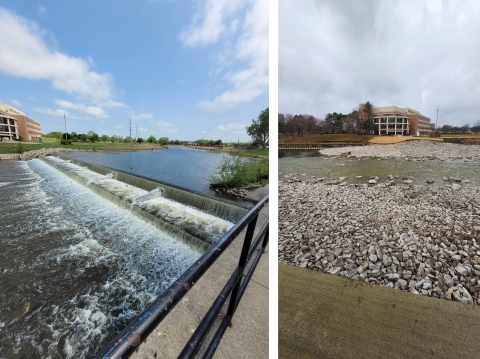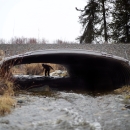States
MichiganThe project to remove the Hamilton Dam on the Flint River has been successfully completed, reconnecting 25 miles of upstream habitat, including over 5 miles of critical Lake Sturgeon habitat in the mainstem Flint River.
This initiative is part of the Flint River Restoration effort, a long-term strategy focused on revitalizing the riverfront in downtown Flint, Michigan. The riverfront revitalization will enhance community connectivity, restore natural ecosystem functions, improve stormwater and flood control, create recreational and economic opportunities, and elevate the overall quality of life for the residents of Flint.
Quick Facts:
| Project Status | Complete |
| Location | MI, Genessee |
| NFPP Project Funding | $855,650 |
| Restoration Techniques | Dam Removal |
| Accomplishments | 24 Stream Miles Reconnected |
| Project Partner Lead | Genessee County Parks |
| Primary Species Benefited | Lake Sturgeon |
The National Fish Passage Program combines technical expertise with a track record of success.
Implemented primarily through the Service's Fish and Wildlife Conservation Offices, the National Fish Passage Program provides financial and technical assistance to partners across the country. Since 1999, the program has worked with over 2,000 local communities, Tribes, and private landowners to remove or bypass over 3,400 barriers to fish passage fish passage
Fish passage is the ability of fish or other aquatic species to move freely throughout their life to find food, reproduce, and complete their natural migration cycles. Millions of barriers to fish passage across the country are fragmenting habitat and leading to species declines. The U.S. Fish and Wildlife Service's National Fish Passage Program is working to reconnect watersheds to benefit both wildlife and people.
Learn more about fish passage and reopen access to over 61,000 miles of upstream habitat for fish and other animals. Staff have expertise in fish migration and biology as well as financial, engineering, and planning assistance to communities, Tribes, and landowners to help them remove barriers and restore rivers for the benefit both fish and people.
Fish passage project proposals can be initiated by any individual, organization, government, or agency. However, proposals must be submitted and completed in cooperation with a Fish and Wildlife Conservation Office. (Please note that fish passage projects being used for federal or state compensatory mitigation or required by existing federal or state regulatory programs are not eligible for funding through the National Fish Passage Program.)
CONTACT A FISH PASSAGE COORDINATOR IN YOUR AREA TO GET STARTED.


